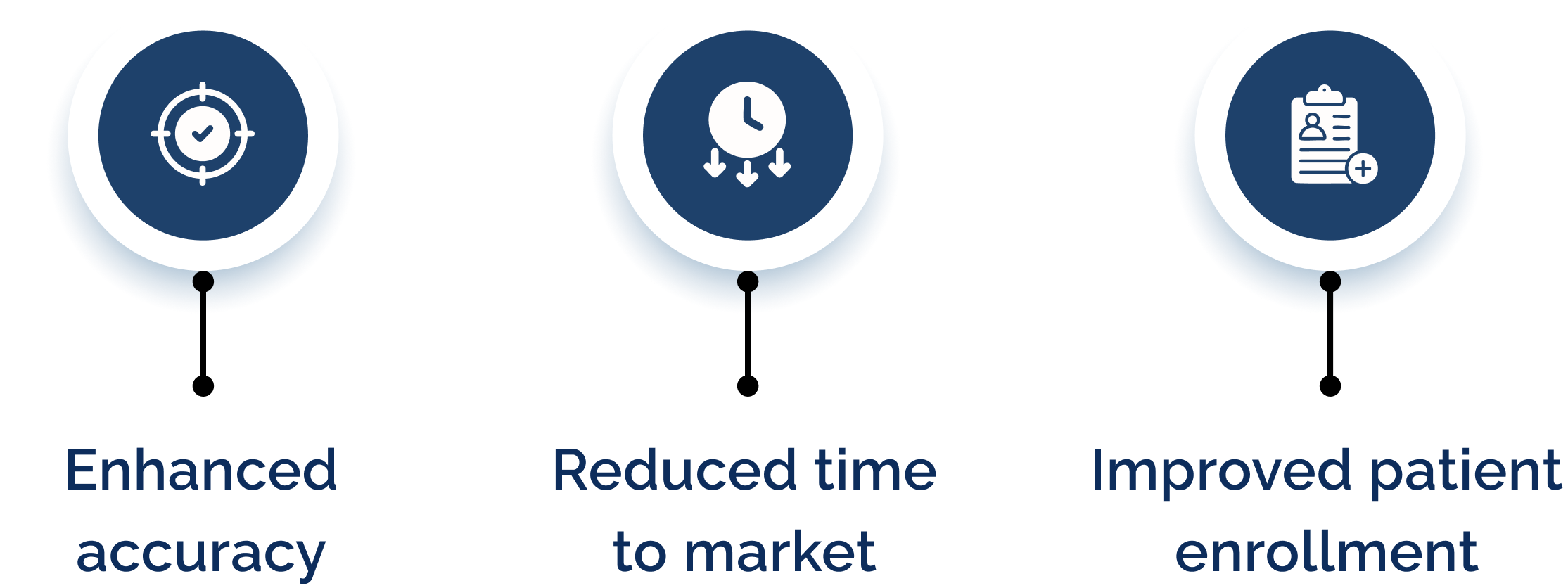Co-create with Ideas2IT















Matching patients to the correct clinical trials has traditionally been inefficient and error-prone, often relying on manual processes and incomplete data. These challenges resulted in missed opportunities, slowing down the trial enrollment process and affecting treatment timelines.The client faced significant challenges in accurately matching patients with suitable clinical trials. Traditional methods could not process large, complex datasets, leading to delays in finding appropriate trials, missed enrollment opportunities, and suboptimal trial recruitment.
The Clinical Trial Match solution was designed by Ideas2it leveraging MolecularMatch, a leader in clinical informatics company with expertise in precision oncology, immunotherapy, and bioinformatics, combined with clinical insights empowering solution. The solution involved the integration of various advanced technologies to provide a seamless, scalable platform for clinical trial matching.
Key technical components included:

The Clinical Trial Match solution brought about substantial improvements in trial matching accuracy, speed, and patient access:
The Clinical Trial Match solution successfully transformed the process of matching patients to clinical trials by leveraging predictive analytics, machine learning, and scalable cloud infrastructure. This solution provides better access to life-saving clinical trials.
We'd love to brainstorm your priority tech initiatives and contribute to the best outcomes.

Pharma & Life Sciences


Matching patients to the correct clinical trials has traditionally been inefficient and error-prone, often relying on manual processes and incomplete data. These challenges resulted in missed opportunities, slowing down the trial enrollment process and affecting treatment timelines.The client faced significant challenges in accurately matching patients with suitable clinical trials. Traditional methods could not process large, complex datasets, leading to delays in finding appropriate trials, missed enrollment opportunities, and suboptimal trial recruitment.
The Clinical Trial Match solution was designed by Ideas2it leveraging MolecularMatch, a leader in clinical informatics company with expertise in precision oncology, immunotherapy, and bioinformatics, combined with clinical insights empowering solution. The solution involved the integration of various advanced technologies to provide a seamless, scalable platform for clinical trial matching.
Key technical components included:

The Clinical Trial Match solution brought about substantial improvements in trial matching accuracy, speed, and patient access:
The Clinical Trial Match solution successfully transformed the process of matching patients to clinical trials by leveraging predictive analytics, machine learning, and scalable cloud infrastructure. This solution provides better access to life-saving clinical trials.




Pharma & Life Sciences


Matching patients to the correct clinical trials has traditionally been inefficient and error-prone, often relying on manual processes and incomplete data. These challenges resulted in missed opportunities, slowing down the trial enrollment process and affecting treatment timelines.The client faced significant challenges in accurately matching patients with suitable clinical trials. Traditional methods could not process large, complex datasets, leading to delays in finding appropriate trials, missed enrollment opportunities, and suboptimal trial recruitment.
The Clinical Trial Match solution was designed by Ideas2it leveraging MolecularMatch, a leader in clinical informatics company with expertise in precision oncology, immunotherapy, and bioinformatics, combined with clinical insights empowering solution. The solution involved the integration of various advanced technologies to provide a seamless, scalable platform for clinical trial matching.
Key technical components included:

The Clinical Trial Match solution brought about substantial improvements in trial matching accuracy, speed, and patient access:
The Clinical Trial Match solution successfully transformed the process of matching patients to clinical trials by leveraging predictive analytics, machine learning, and scalable cloud infrastructure. This solution provides better access to life-saving clinical trials.



We'd love to brainstorm your priority tech initiatives and contribute to the best outcomes.

From Manual Matching to Real-Time Precision: A Case Study in Clinical Trial Enrollment Acceleration
A leading life sciences company faced a persistent bottleneck in clinical trial enrollment. Patient-trial matching was manual, error-prone, and slow. Clinical sites operated on disconnected data, inconsistent workflows, and static eligibility checks, resulting in missed enrollment windows and delayed trial timelines.
With expanding research portfolios in oncology and immunotherapy, the need was clear: improve precision and scale enrollment without adding operational burden.
The client’s existing systems could not handle high-dimensional, fast-changing datasets, especially genomic data from NGS panels and rare disease cohorts.
Challenges included:
This led to slower trial activation, fewer patient enrollments, and missed opportunities for care delivery and research impact
Ideas2IT collaborated with MolecularMatch, a clinical informatics leader, to build a precision-driven trial match platform integrating molecular, clinical, and operational data into one intelligent workflow.
Core Capabilities and Architecture:
This system enabled trial-matching intelligence to flow from genomic labs to care teams within hours.
The platform now powers real-time enrollment support across oncology and immunotherapy trials bringing more eligible patients into life-saving studies.










